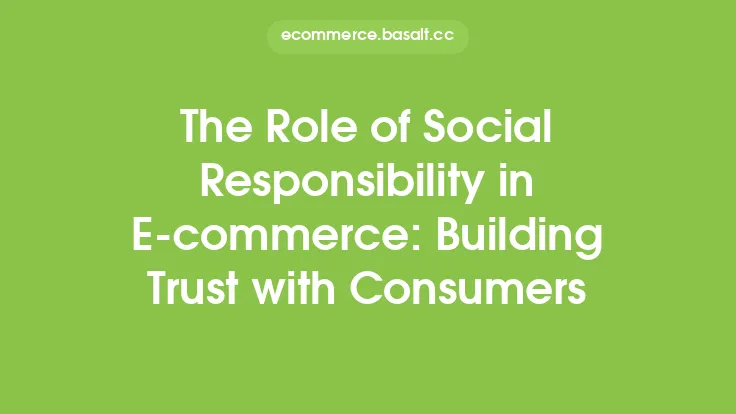In today's digital age, e-commerce has become an integral part of the global economy, with millions of businesses operating online and reaching customers worldwide. As the e-commerce industry continues to grow, it's essential for companies to adopt practices that not only benefit their bottom line but also contribute to the well-being of society and the environment. This is where corporate social responsibility (CSR) comes in – a business model that helps companies balance their financial goals with social and environmental responsibilities. In the context of e-commerce, CSR is crucial for building trust with customers, enhancing brand reputation, and contributing to a more sustainable future.
What is Corporate Social Responsibility in E-commerce?
Corporate social responsibility in e-commerce refers to the voluntary efforts made by online businesses to improve social, environmental, and economic impacts. It involves integrating social and environmental concerns into a company's operations, products, and services. E-commerce companies can demonstrate CSR in various ways, such as donating to charitable causes, reducing waste and carbon emissions, promoting fair labor practices, and supporting local communities. By embracing CSR, e-commerce businesses can create a positive impact on society and the environment while also benefiting their own operations and reputation.
Benefits of Corporate Social Responsibility in E-commerce
The benefits of CSR in e-commerce are numerous and can have a significant impact on a company's success. Some of the most notable advantages include:
- Enhanced brand reputation: Companies that demonstrate a commitment to social and environmental responsibility are often viewed more favorably by customers, investors, and other stakeholders. A positive brand reputation can lead to increased customer loyalty, improved sales, and better recruitment and retention of employees.
- Increased customer trust: When e-commerce companies prioritize CSR, they demonstrate to customers that they care about more than just making a profit. This can lead to increased trust and loyalty, as customers are more likely to support businesses that share their values.
- Improved risk management: By addressing social and environmental concerns, e-commerce companies can reduce their risk of facing negative publicity, lawsuits, or regulatory penalties. This can help protect a company's reputation and bottom line.
- Access to new markets and customers: CSR can help e-commerce companies tap into new markets and attract customers who prioritize social and environmental responsibility. This can be particularly beneficial for businesses looking to expand their customer base and increase sales.
- Cost savings: Implementing sustainable practices and reducing waste can help e-commerce companies save money on energy, materials, and other resources. This can lead to improved profitability and competitiveness.
Implementing Corporate Social Responsibility in E-commerce
Implementing CSR in e-commerce requires a thoughtful and multi-faceted approach. Here are some steps e-commerce companies can take to integrate social and environmental responsibility into their operations:
- Conduct a social and environmental impact assessment: Identify areas where the company can improve its social and environmental performance, such as reducing energy consumption, minimizing waste, or promoting fair labor practices.
- Develop a CSR strategy: Create a plan that outlines the company's CSR goals, objectives, and initiatives. This should include specific targets, timelines, and metrics for measuring progress.
- Engage stakeholders: Involve employees, customers, suppliers, and other stakeholders in the CSR planning and implementation process. This can help ensure that the company's CSR efforts are meaningful, effective, and aligned with stakeholder values.
- Monitor and report progress: Regularly track and report on the company's CSR performance, using metrics such as carbon emissions, waste reduction, or community engagement. This can help demonstrate the company's commitment to transparency and accountability.
Best Practices for Corporate Social Responsibility in E-commerce
To get the most out of CSR, e-commerce companies should follow best practices that prioritize transparency, accountability, and continuous improvement. Some key best practices include:
- Integrate CSR into core business operations: CSR should be embedded into the company's DNA, rather than treated as an add-on or afterthought.
- Set clear and measurable goals: Establish specific, measurable, achievable, relevant, and time-bound (SMART) goals for CSR initiatives, and track progress regularly.
- Engage with stakeholders: Foster open and honest communication with stakeholders, including employees, customers, suppliers, and community members.
- Prioritize transparency and accountability: Regularly report on CSR performance, using standardized metrics and frameworks such as the Global Reporting Initiative (GRI) or the Sustainability Accounting Standards Board (SASB).
- Continuously monitor and improve: Regularly assess and refine CSR strategies, using feedback from stakeholders and lessons learned from implementation.
Conclusion
In conclusion, corporate social responsibility is a vital component of e-commerce, enabling companies to balance financial goals with social and environmental responsibilities. By embracing CSR, e-commerce businesses can build trust with customers, enhance their brand reputation, and contribute to a more sustainable future. As the e-commerce industry continues to evolve, it's essential for companies to prioritize CSR and integrate social and environmental responsibility into their operations. By doing so, they can create long-term value for their business, stakeholders, and the environment.





